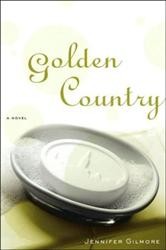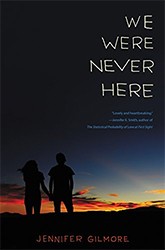An interlocking puzzle of a story forming a unique, original whole, Something Red presents a fascinating picture of a complex but loving family but more importantly of a complicated and unnerving time in recent American history. The Goldsteins, a second generation Jewish family consisting of parents and two teenaged children, navigate life in suburban D.C. as the 1970’s draw to a close. It is a tricky and uncertain period for the country: the Iranian Hostage Crisis is raging, the U.S. is fumbling for a foothold in a new relationship with Moscow, youthful rebellion is taking a new and less idealistic turn. The HUAC hearings, the Vietnam protests, and the roiling 60’s are not all that deeply in the past and are still exerting a mighty pull on the present. The Goldsteins, like many others, must find a place in the newly emerging decade and must discover which emotional baggage can be jettisoned, and which follows and clings and cannot be disposed of at will.
This is superbly written fiction. Not only does time and place ring with perfectly authentic pitch, but the characters feel real enough to be your family. Gilmore’s technique of frequently repeating a scene from a different point of view adds substance and depth to the narrative and adds sympathy to the characters. Each character is faceted and layered, each has integrity and flaws, each has the capacity to grow. Symbols and themes are richly and densely woven into the fabric of the story and seamlessly appear and reappear throughout — heavy symbols on occasion but always presented with a light and deft touch. The careful reader will want to ferret out and examine these symbols as they appear so I will touch here on only two of the most major, that of sports, which means something different and personal to each of the characters, and that of food. Food is more than mere sustenance here; it is politics, it is livelihood, it is decadence, it is disorder, it is betrayal, it is comfort, it is love.
Carefully constructed and intricately imagined, this book satisfies as narrative and deepens our understanding of an era not too long-gone and difficult to forget.
Interview
Jennifer Gilmore’s first novel was Golden Country (2006). Here, she talks about her newest novel, Something Red, published in March, 2010, with Jewish Book World’s Michal Hoschander Malen.
Currently Jennifer teaches fiction writing at Eugene Lang College, the New School. She lives in Brooklyn, NY, with her husband, Pedro Barbeito, and their Springer Spaniel.
Michal H. Malen: Both of your novels feature immigrant Jewish families. Is there a common theme between both of them?
Jennifer Gilmore: There is but in a way that’s not very obvious because when I wrote the second book, I wasn’t thinking of it as a continuation of the first book. The first book takes place from the 20’s through the 50’s over several generations. The second book starts in 1979 and deals mostly with the second generation even though they are haunted by the past. I think the connection is in the way history affects families. With the first book, I was interested in how the families of immigrants made America and in this book I became interested in how the circumstances these people found themselves in affected their lives. I think the only way to do that is over the generations. Irving Howe said that when, in the 50’s and 60’s, everyone left the inner cities and went to the suburbs, the Brenda Patimkins, there wasn’t going to be any more Jewish literature; everything was going to be just American. Of course, I would never argue with Irving Howe but I started to think about that, about how going to the suburbs became so much part of the immigrant experience and the Jewish experience. It didn’t really take anything away from it. I wanted to continue the story and really had to do that with the next generation.
MHM: Something Red is richly textured with symbols and themes. I don’t want to put them all out on display before the reader has a chance to encounter them in the book but I’ll pick two themes and ask what they mean to you. Let’s start with sports.
JG: I haven’t been asked much about the sports. I wrote my way into the sports situation because of the Olympics and the Olympics are tied up with politics. This is a novel about politics. I wanted the love of sports to come through and not be overtly political but, of course, it’s tied to 1956 and the Soviet Union.
Benjamin, my character who goes to Brandeis, starts out as a typical high school jock. I wanted him to change and find his radical self and he does that through politics. But he does it with the Olympics through the boycott of the boycott. We don’t often associate Jews with sports and I wanted to do something with that stereotype.
MHM: Each character is involved in some way with issues relating to food and sustenance. Can you talk about why you made that choice?
JG: I wanted to look at the way food plays out in a family. Everything in my family happened at the dinner table. I also wanted to deal with how things played out in the world in 1979. When I told my editor I wanted to write a book that dealt with the grain embargo of 1979, needless to say she wasn’t doing cartwheels. My father was an economist and he wrote books about grain embargoes, so that was a really big deal in my house. The grain embargo, for those who don’t know, happened when the Soviets invaded Afghanistan and Jimmy Carter tried for the first time to cut off food from the Soviet Union. I remember thinking of the Soviet children without any meat or bread or only stale bread. I remember the feeling of American privilege.
There is the young girl in the book who has an eating disorder. She’s trying to control her life, her sexuality, her rocky adolescence by what she puts into and takes out of her body. Her mother is a caterer so it also has to do with the mother-daughter relationship. There is the idea of food as identity for all sorts of immigrants. What they eat, how they eat, and how they get their food has so much to do with their lives. I wanted to investigate it in all those ways.
MHM: You’ve done an amazing job of bringing an era to life using the music, the news and the social constructs of the time. What tools did you use to make the late 70’s feel so immediate and close?
JG: I thought it would be much easier than writing about the further past. It was set in 1979, and I was really young then. It was actually more difficult than writing about a time I never experienced like the 20’s and 30’s. I saw photographs of the 20’s and 30’s and that gave me confidence to write about that time. But when it came to the 70’s, I could picture the streets even though they’ve really changed. I could just say the words “Love’s Baby Soft” or “Herbal Essence” and be instantly carried back there. I did not want to name drop in a way that got in the way; the characters could really allow people to have their own experiences, like Gunne Sax shirts. You have to be careful not to be too kitschy. I took out my Pet Rock references; I didn’t want to be 70’s silly. But I did want people to have the sense of a lived-in moment.
MHM: How does the family’s Jewish background inform the characters’ lives?
JG: Initially I thought, I would investigate what it means to be Jewish culturally, that this book is going to investigate what it means politically. Religion does come up here, though. The mother is distraught and knows she has to do something for herself, and her friend suggests she go back to temple, Temple Sinai, that maybe that’s what she needs. But she decides that she wants something more like EST self-help empowerment. She doesn’t think religion is the right choice for her. And she is skeptical of her father who has moved out to Hollywood and recently reconnected with religion. She thinks he’s just dealing with his own mortality. I wanted to deal with the notion that much of this is choice. The choice for us is how observant we are and that has a lot to do with how we were raised.
The father, Dennis, grew up Jewish but for him it was more about politics than religion, and he doesn’t give the kids anything to go on and that troubles the mother. In the end, what happens to those kids when they grow up? They’re going to have to find their own rituals. They’re going to have to create their own idea of religion even though they strongly identify as Jews. I don’t think they know what that means religiously though.
MHM: Who are some of the authors you enjoy or feel have influenced your work?
JG: I haven’t modeled my writing on anyone but there are authors I admire. For this book, in particular, I read The Book of Daniel. I had never read Doctorow before and that book was really formative for me. Everyone in this novel is haunted by the Rosenberg execution, so it really connects. We hadn’t processed everything about it at the time he wrote it; we couldn’t. It would have been different if it had been written now. It was interesting because it was unfiltered.
In general, I’ve been influenced by anyone from Delmore Schwartz to Grace Paley. I learned a lot about dialogue from her. Leonard Michaels, I adore. I love his essays. I feel like he’s gotten second schrift to Philip Roth. I love a lot of Roth’s books, too, but I don’t really love Roth any more. I did love American Pastoral and The Plot Against America, which were amazing, wonderful books. Also, I read Mary Gateskill, who is a very brave writer in terms of the inner lives of her characters. I kind of resist the idea of historical fiction because we think of that as costumey in some way and I’m much more interested in the inner lives of characters, although I do like setting them elsewhere. I love short stories. I love Carson McCullers.
MHM: Are you working on something new now? What can we look forward to?
JG: I’m working on something now that gets closer to the present. Maybe in some way I am still moving my way through the generations. I hope I’m going to be able to deal with it differently but it’s still going to involve the way the past is with us all the time. The way memory works is very interesting to me.
Michal Hoschander Malen is the editor of Jewish Book Council’s young adult and children’s book reviews. A former librarian, she has lectured on topics relating to literacy, run book clubs, and loves to read aloud to her grandchildren.





